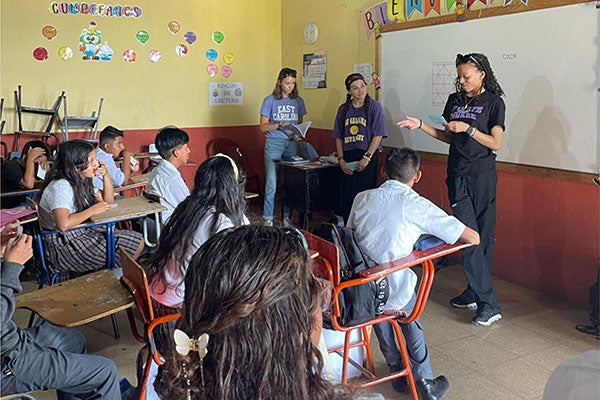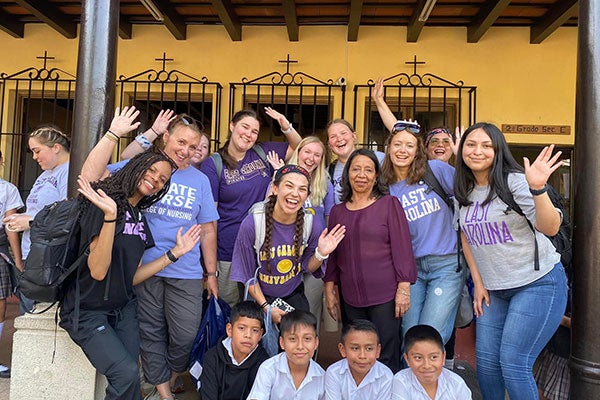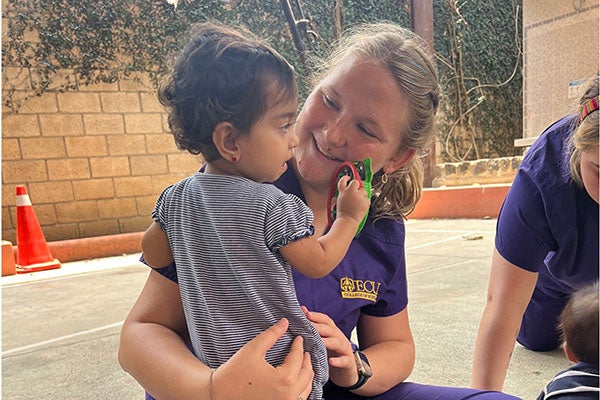Nursing students visit Guatemala to expand cultural understanding
Sometimes the best way to understand how to care for those who are outside of the mainstream, those who aren’t privileged in a society, is to learn how to communicate with them, to understand where they come from.
For nine East Carolina University College of Nursing undergraduates and two of their faculty mentors, that meant a three-week stay in a small town in Guatemala, learning Spanish and living with members of the local community.

College of Nursing students speak with members of the San Miguel Escobar community about dental hygiene during their trip in May. (Contributed photos)
College of Nursing faculty members Terri Joyner and Claudia Kitchin escorted nine Bachelor of Science in nursing students to San Miguel Escobar, just west of Guatemala City, after the spring semester ended in May.
When the students returned, they gave a presentation at the College of Nursing about their experiences. Chief among their observations was the realization of depravation faced by the Guatemalan communities they lived in — including clean water, basic sanitation and access to reliable health care.
“The importance of clean water, obviously health, hygiene and overall well-being — many communities in Guatemala are facing access to safe and clean drinking water. At Casa Jackson there was h. pylori in the babies’ systems, and they think that there is a correlation. Babies should not be having h. pylori,” said Rosemary Kopelwitz, who will start her final semester of nursing school in August.
Helicobacter pylori is a bacterial infection that can cause stomach ulcers and is transmitted through contaminated water. While on their trip, the ECU students said they were diligent about drinking filtered water to prevent infection from h. pylori and other infectious diseases.
“We had to use water from our water bottles to brush our teeth. We had to be very careful not to open our mouth in the shower, like even just a tiny bit,” Kopelwitz said.
Learning the Language
For the students, learning Spanish, and getting an appreciation for the Guatemalan culture, was turbocharged by living in small groups with five host families.
“This is the most phenomenal group of young ladies to take for that length of time, being fully immersed in that culture,” Joyner said. “Nobody spoke English to us there. It’s a full immersion program, and these ladies worked as a team.”

College of Nursing students pause for a photo outside of a school in Guatemala they visited to give a health promotion class.
The primary purpose of the trip was to learn Spanish and become steeped in the culture. The students did so through intensive daily interactions with members of the community they lived in — particularly through volunteering with malnourished children at an orphanage and by being tourists.
Kitchin, whose first language is Spanish, refused to translate for her students.
“She wouldn’t translate a word for us,” said Olivia Thill, a second semester student. “She even had a shirt that said, ‘Not today.’”
“It was my way to push them to speak the language,” Kitchin said. “I helped them when they got stuck.”
Living with host families forced the students to practice the language they learned in morning classes at La Union, a Spanish language school in San Miguel Escobar.
All nine students spoke glowingly about the families they lived with and the opportunities they had to put their new language skills to use.
“No one in our host family spoke any words of English, so communication was definitely a big challenge. But that never stopped us,” Kopelwitz said. “In our house the little boys loved having two girls to play games with, and I lost count the number of times the 6-year-old asked if we had boyfriends or if we could play just one game of soccer.”
The other groups of students had equally welcoming experiences, which helped them to perfect their language skills late into most evenings.
“The mom made us lemonade at night at 10 p.m. because they don’t sleep there, I swear,” Kopelwitz said. “We would talk Spanglish to the best of our abilities, point a lot and laugh with them. The sisters really bonded with us, helping with homework because they were learning English while we were learning Spanish.”
Giving Back
The trip wasn’t just about learning Spanish, though. Sharing what they had learned in their nursing class at ECU with the residents of San Miguel Escobar was equally important.

College of Nursing students interact with children at an orphanage during their three-week visit to learn Spanish and share their medical knowledge.
“We did work at Casa Jackson, which was a home for children who had malnutrition in Guatemala, which is a huge problem,” nursing student Alia Throckmorton said.
The ECU students gave community health talks, particularly for single mothers, about contraception, menstrual cycles and breast cancer.
The student group also toured a local hospital to get a sense of what health care delivery looks like in a developing community and how health care professionals make the most of limited resources.
After graduation, Throckmorton wants to return to the College of Nursing to become a midwife. Interacting with Guatemala’s midwife equivalents gave her a new perspective on the cultural differences in care given to expecting mothers.
“There are a lot less regulations, but it’s an interesting balance between what we do here in the U.S. We kind of over-medicalize birth, whereas there it is under-medicalized. It was interesting to see the two extremes and kind of think about how in my future practice I’ll find a middle between the two,” Throckmorton said.
Throckmorton said her eyes were opened not only to the disparities of care between Guatemala and the U.S., but how Spanish speakers living in America — especially in rural areas — are burdened by communication barriers.
“In their mind, it’s so clear what they’re trying to say, and you don’t understand it and it makes you feel stupid. It makes you feel like you’re not doing what you need to do,” Throckmorton said. “It really gave me empathy for people here in the U.S. for whom English isn’t their first language. Having to take time to get a translator every time you go in the room is frustrating when you don’t speak the language and you don’t know what they’re trying to tell you.”